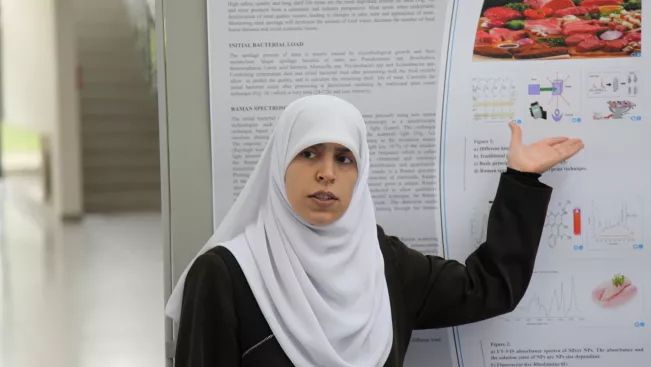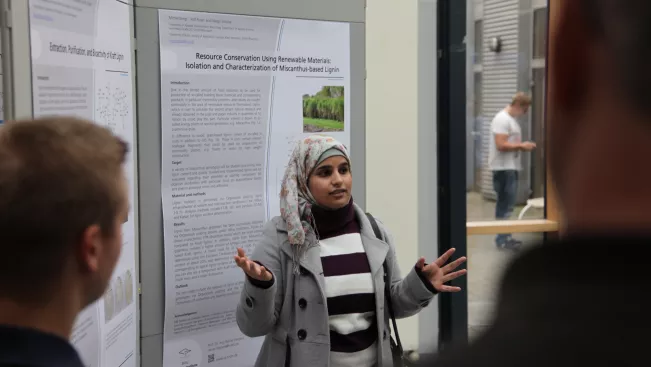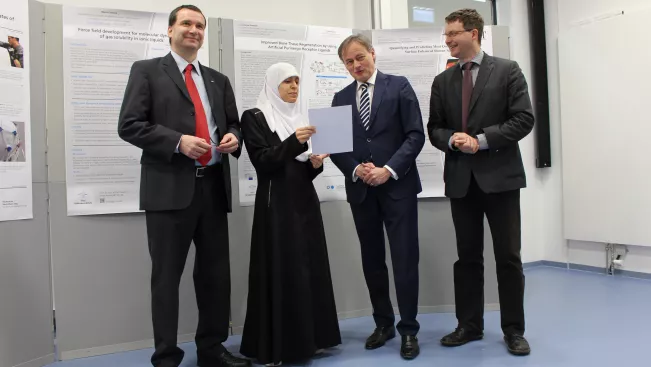Graduate Institute
From Zarqa to Rheinbach and back again
Adventures of a Jordanian female PhD student at H-BRS
by Barbara Hillen
When the young student Sawsan Jaafreh stood in the kitchen 20 years ago preparing poultry, she had no idea that this activity would one day shape and inspire her academic career. She smelled the raw meat to make sure that it was not spoiled. The heat in her Jordanian homeland could be brutal and she had long since become accustomed to it putting an abrupt end to the anticipation of a tasty dish. But this time the breast fillets seemed to be perfect and soon sizzled in the pan.

Sawsan Jaafreh had just begun fulfilling her dream of studying chemistry at the state-run Hashemite University in her Jordanian hometown of Zarqa, just northeast of the capital Amman. Little did anyone know that the foundation of Hashemite University in 1996 had been preceded just one year before by the inauguration of H-BRS in faraway Germany.
Sawsan's parents were proud of their daughter when she graduated from Hashemite University in 2003 with a Bachelor's degree, but they were downright astonished when, with the help of a scholarship, she set out to complete a Master's degree. She was the first of both genders in her family ever to step into a university classroom, and although her family appeared to feel quite honoured, Sawsan was aware of a lack of deep understanding and support. During her Master’s studies, she worked as a student assistant in the Department of Chemistry, which gave her valuable insights into everyday life at the university and enabled her to help shape a young university that was still developing. After she finished her Master’s thesis "Reaction Cross Section in Atom-Diatom-Molecule Collisions" in 2006, her desire to teach crystallized. She accordingly worked as a teaching assistant at her home university for two years until being promoted to the post of lecturer in 2008, where she remained until 2012. She could have continued in this profession, because by that time she had achieved more than was normally expected of her female peers, many of whom decided to give up their jobs once they got married and had children. But Sawsan had developed a passion for research. She realized that the world of science opened up freedoms for her that she wanted to explore. She was keen to study abroad, but a female all by herself? Never, said her parents. “I fought to gain my family's approval and won this battle but failed to get the support of my community.” Nevertheless, an opportunity to explore the world of microorganisms opened up when Sawsan successfully applied for an EU-funded Erasmus Mundus scholarship (Avempace) and received an invitation to go to Germany, more precisely to Bonn-Rhein-Sieg University of Applied Sciences, in 2012. From then on, her horizons broadened and she set off for a new life in Germany.

Avempace (1085-1138) was a medieval Spanish-Arab scholar after whom a project in the then Erasmus Mundus II program (now Erasmus +) was named. This program promoted the individual mobility of scholarship holders in numerous EU countries. This support was available to all members of the university: students (Bachelor’s, Master’s, PhD), postdocs, professors and employees in general. From 2011 to 2017, H-BRS was a partner in a consortium led by the TU Berlin. The Avempace project encompassed Jordanian, Syrian, Palestinian and at times Lebanese institutions as well as institutions in numerous EU countries. In all, 30 scholarship holders from these countries came to H-BRS through the program, including eight doctoral students – Sawsan Jaafreh was the first of them, Abla Alzagameem from Tafila Technical University in Jordan was another, while still another was PhD student Shatha Abu Shanab from the Palestinian Al Quds University in Jerusalem. Initially, there was a great deal of discussion at H-BRS as to whether a doctoral candidate could be accepted as a scholarship holder since it was not clear whether they would ever be able to take a doctoral examination in Germany. In 2013, the possibility of Universities of Applied Sciences having the right to award their own doctorates still seemed remote, and in 2020 this goal still has not been fully achieved. Finally, the University of Bonn and the Technical University of Cottbus (BTU) agreed to accept Sawsan and Abla as doctoral students, but they were supervised at the H-BRS (Rheinbach Campus).
In Professor Margit Schulze and Professor Peter Kaul from the Department of Natural Sciences, Abla and Sawsan found courageous, unconventional, goal-oriented supervisors who not only took the risk of supervising someone unknown from another country and culture but also took the very difficult path of overseeing a dissertation project from a University of Applied Sciences. This type of academic supervision was indeed a daring venture with many unknowns. Motivating the young female researchers and acquiring new skills in intercultural competence as teachers was an exciting, strenuous but enriching process for Margit Schulze and Peter Kaul. Moreover, they frequently found themselves tilting at German educational windmills, of which the female doctoral students from Jordan often had no precise idea. Shatha also received exceptional support from her supervisor Prof. Marco Winzker from the Department of Electrical Engineering, Mechanical Engineering and Technical Journalism. Shatha’s research focused on Remote and On-Site Laboratory Systems for Low-Power Digital Circuit Design, and she successfully completed her doctorate in 2018 in cooperation with the University of Siegen.

While doctoral student Abla Alzagameem investigated several types of lignins as part of her research into alternative and sustainable packaging applications, Sawsan started to work with Raman spectroscopy combined with chemometric methods. In May 2015, her scholarship expired with no end to her dissertation project in sight. Sawsan had to admit to herself that living her new life was harder than expected. Establishing contacts, finding her way around in a strange country with a difficult foreign language, motivating herself, funding her studies – these were all processes that had to be learned and explored. Even though her goal sometimes seemed far distant, partly because, as in any research project, there were setbacks and uncertainties, she persevered and never lost sight of it. Her supervisors also believed in her and provided consistent support, encouraging her for example to apply for a doctoral scholarship from the H-BRS Graduate Institute. From June 2015 to May 2020, this provided her with the funding she required to effectively complete her work. Prof. Rainer Herpers, Director of the Graduate Institute, has followed her academic career with the greatest interest. He has done more than almost anyone else at H-BRS to promote academic exchange between the Department of Computer Science and Arab partner countries over the past decade, and hardly a year has passed without him personally promoting international relations in Jordan, Lebanon, and Morocco.
During the course of her research, Sawsan found confirmation that her research topic was highly relevant: her task was to develop methods of characterising and analysing the quality and shelf life of poultry meat in a way which could supersede traditional techniques, since these were becoming increasingly costly, laborious and time-consuming for the meat industry and losing touch with modern requirements. Raman spectroscopy, on the other hand, allows poultry meat to be inspected in real time. In the end, Sawsan was able to distinguish and classify eight strains of bacteria associated with meat spoilage. Microorganisms commonly found in poultry meat monitor the spoilage process and provide information on the quality and remaining shelf life of commercially packaged fresh chicken. Research is of intense interest to poultry production lines.
Sawsan found that research could be an application-oriented, exciting, but also lonely process that continued right up to the last minute of her dissertation procedure. Because of the pandemic, her viva at the University of Bonn in August 2020 was actually conducted by video conference: "Unfortunately, the doctoral committee did not allow anyone to enter the faculty building with me, so I have no recording of my viva." And so this degree somehow became symbolic of Sawsan, the lonely warrior for whom everything turned out well in the end and who left the Dean's building of the Faculty of Mathematics and Natural Sciences at the Excellence University of Bonn as a Dr. rer. nat. and a straight A graduate, a "magna cum laude". Peter Kaul insisted on organizing a Corona-compliant drinks party for Sawsan with a few colleagues on the Rheinbach campus. Shortly afterwards, her visa expired and she set off for Jordan. “I hope I can convince people here in Jordan that females are capable of surviving the toughest situations and that they can win. And I hope that I can convey a positive image of German culture and bridge the gap between Eastern and Western mentality. I firmly believe that just one step can make a difference.” Gratitude is evident in her voice, but also the sobering certainty that a new stage of life has dawned in uncertain times. "A lot has changed here in the eight years I have been away. I now have to start afresh." At H-BRS we have no doubt that Dr. Sawsan Jaafreh will succeed as Assistant Professor at Hashemite University. In November 2020, her colleague Dr. Abla Alzagameem also finished her PhD at the Technical University of Cottbus (BTU) with a “magna cum laude”, leaving her proud supervisor, Prof. Margit Schulze, and Rheinbach behind while turning to the future, which some are convinced will be female.